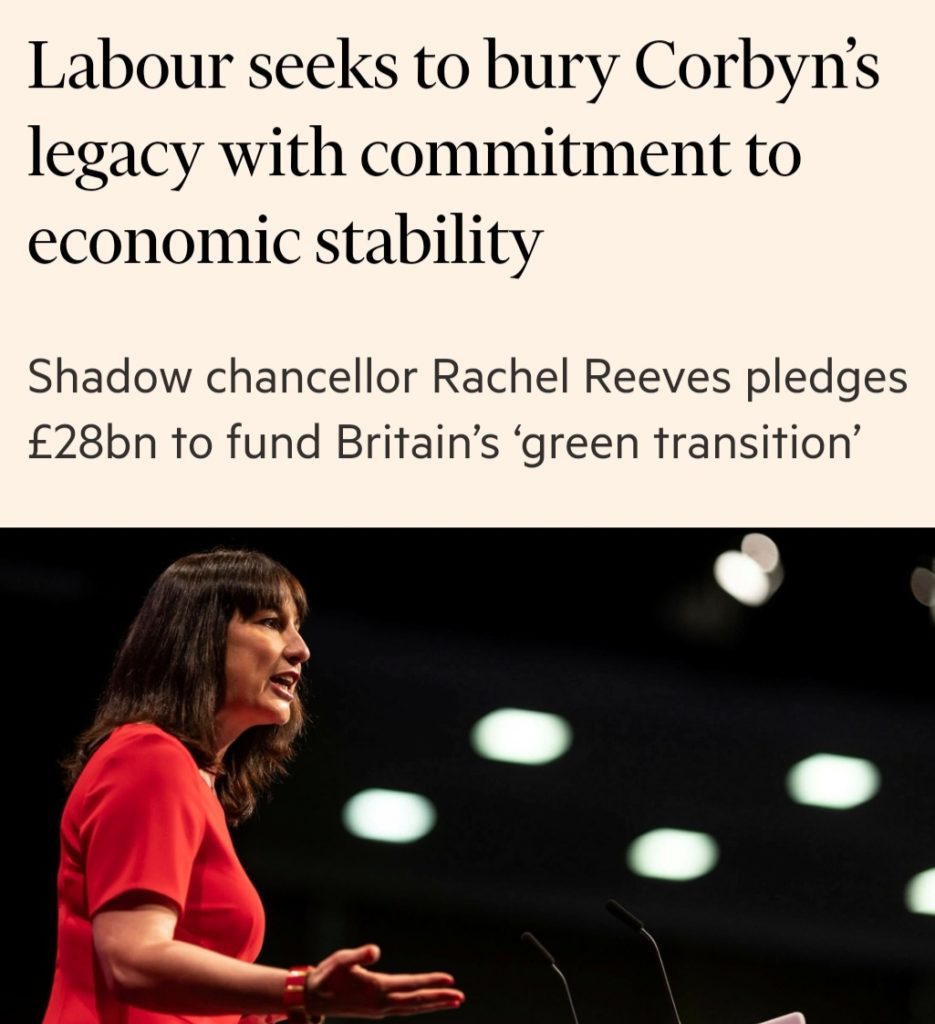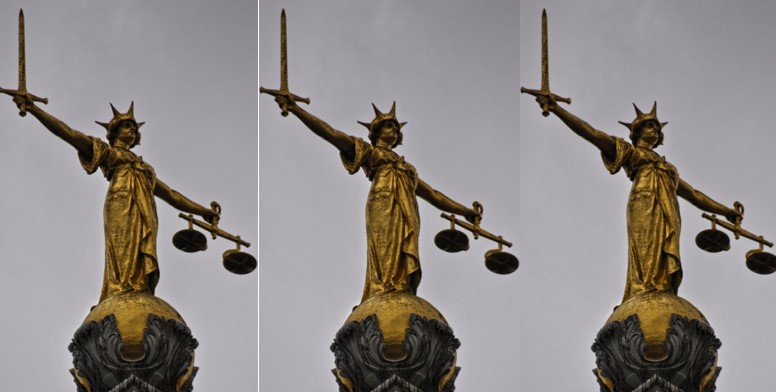British capitalism is in a profound crisis. The Tory administration, the most corrupt and inept in modern times, is in utter disarray. The big majority of the population are facing cuts in living standards, higher taxes, queues for petrol, with worse to come. But here in Brighton, Labour’s right wing are celebrating a narrow victory in an organisation/constitutional coup that is an irrelevance to ninety-five per cent of the population.
As anticipated, yesterday’s four card votes on rule changes produced four votes in favour, although we are now able to look at the results in detail. On the EHRC change, setting up a general secretary-dominated ‘independent’ disciplinary process, 35% of CLP delegates voted against and only 17% of trade unions, giving an overall 74% in favour. Despite the defeat, it is notable that fully a third of the CLP delegates refused to be intimidated by an atmosphere of loud and insistent claims, amid staged standing ovations and cheers, that they were all anti-Semites.
The subsequent card vote on safeguarding and Disciplinary procedures was agreed by a similar number – 62% of CLP votes and 61% of union votes, giving an overall 62%. The card vote on Labour conference was supposed by a bare majority of CLPs – 51% – and 61% of unions, giving an overall victory of 56%.
Arm-twisting in union delegations save the day for Starmer
The very contentious vote on electing the party leader, raising the threshold to a fifth instead of a tenth of Labour MPs was also passed, but with a significant break-down as follows: 53% of CLPs voted AGAINST this change, but only 40% of affiliated unions were against. According to press reports, the UNISON delegation, defying its own union policy, its ‘Labour Link’ national committee and its NEC, voted to reduce the powers of CLPs and party members and increase the powers of MPs. It is as well for Starmer that he got this change through now, because in the future he may not be able to rely so well on friendly trade union bosses.
Nevertheless, on this key vote, Starmer failed to sway a majority of CLP delegates, despite being there in person, and he was forced to rely on the power of union bosses arm-twisting their delegations.
In this morning’s papers, Peter Mandelson is quoted as saying that the rule change “will keep out another Corbyn”. That is really what this debate has been all about – to prevent the radical aspirations of Labour’s rank and file and Labour voters from being reflected in a radical leader and Labour MPs. It is a big setback for members, but not the end of the Labour rank and file, not by a long chalk.
We should also add a correction to yesterday’s report, when we said that the second composite on a Green New Deal was lost but in fact, it was PASSED on a card vote, with 50% of CLPs and 69% of unions in favour. It was passed, therefore, with an overall 59% vote. The CAC itself also corrected the vote on the endorsement of David Evans as general secretary. His margin of victory was smaller than had been previously announced, reduced from 59-41 to 57-43.
As a post-script to the debate on energy, it is clear from this morning’s press reports, it is clear that the Shadow Cabinet is in disarray on energy policy. In an interview, Keir Starmer ruled out taking the energy utilities into public ownership, whereas Shadow Minister, Ed Miliband was clearly not ‘on script’ in another earlier interview when he stayed with Labour’s original commitment (and one of Starmer’s ‘pledges’) for public ownership.
International debate getting back to making waves
After a pretty anodyne introduction by Lisa Nandy, Labour’s Shadow Foreign Secretary, the delegates immediately got back to making waves. Unlike two years ago, when the conference was festooned with Palestinian flags waved by delegates, the conference organisers have banned flags, which for them, is just as well, because the overwhelming sympathy of delegates was in favour of the composite motion on Palestine.
The supporters of the right-wing Jewish Labour Movement, mobilised to clap and cheer in the debate on the EHRC rule change yesterday, were now largely absent. We cannot report in detail the points made by the mover (Young Labour) and seconder, or other speakers, but the text of the resolution (here) speaks for itself and the sympathies of conference were clear.
One of the delegates (an MP) who spoke against, accused the resolution of being ‘too shouty’ and too hard. He offered mealy-mouthed support for Palestinians but typified the supporters of Israeli government in the Labour Party in not offering a single point of criticism or condemnation of it. He was not well received. It was a relatively short discussion, with only four speakers, leaving delegates to protest and ask why the session was so brief, especially given that over three hours were given over to a session on ‘devolution’ this afternoon. When it came to the voting, the Palestine resolution was passed overwhelmingly on a show of hands.
Replying to the debate, MP John Healey, Shadow Defence Minister, mostly addressed issues that did not come up in the international debate: the Armed Forces and Defence spending. He failed to mention any of the resolutions tabled for the conference, clearly speaking to the representatives of the press – to show how ‘responsible’ Labour is – rather than the delegates.
Rachel Reeves’ two speeches: to the media and to conference
A resolution was moved on post-pandemic industrial and economic policy was moved, including the simple demand that “Working people must not now pay for this crisis”. It called, among other things for “real and substantial improvements in funding public services through progressive taxation, including taxing the wealth of the very wealthiest…” it also called for a publicly-owned railway system. As we have suggested in previous reports, it reflects the general mood music of conference on most political issues, far to the left of the leadership.

The (already short) session on post-pandemic industrial policy was interrupted by the speech of Rachel Reeves, former economist at the Bank of England and now Shadow Chancellor. This is the same person, let us recall, who in an infamous speech in 2013, said, “Labour will be tougher than the Tories when it comes to slashing the benefits bill”. (Guardian). As expected, she made two speeches in one. Her main audience was the press and business, and she was at pains to make it clear that Labour is a party of business. But the only way she could guarantee to get a good reception from delegates was to sprinkle her speech liberally with radical-sounding phrases.
Abolition of business rates promised
It was necessary, to get conference alongside, to make pledges about taxing the rich and doing away with (“some”) tax-breaks. There was not a delegate in the conference who would object to doing away with the dodges that allow the miserably low net tax rates of the likes of Amazon. “If you can afford to fly to the Moon”, Reeves said, “you can afford to pay your taxes here.”
Not surprisingly, she was also applauded for saying, “I will not balance the books on the backs of working people” – what’s not to like? Likewise, she was on a winner pledging to do away with the charitable status of private schools. Reeves also made the commitment to scrap business rates altogether and introduce a newer, ‘fairer’ system of taxation to fund public services.
Talking about the corruption around the Tories’ Covid contracts, she said to applause, “We want our money back!” promising that an incoming government would investigate dodgy Covid contracts. Her biggest cheer was for a promise for “the biggest insourcing of public contracts in a generation.” Again, what’s not to like? But on the other hand, given her starry-eyed worship of all things Blair and Brown, the reaction of many delegates, understandably is “Mmm. We’ll see”.
A pledge for £28bn of investment in a green economy – every year – was also bound to be popular among delegates, but there is more than a whiff of suspicion over her mention (this was for her ‘other’ audience) of “difficult choices” and “firm foundations” for public finances. “There will be no commitment”, she said “for policies we can’t pay for”.
A new organisation offered, to oversee the value for money in public contracts, looks like a souped-up version of the Audit Commission, which would be an Establishment obstacle to any meaningful reforms by a Labour government. It was all very radical-sounding, but reading carefully between the lines and interpreting the messages to business, it was an offer of public money to fund capitalism, a few half-hearted pledges for ‘fairer’ taxation and what sounds suspiciously like a strait-jacket on public services.
Labour’s NEC trade union section largely unchanged.
Back to real life, conference considered a motion on banning fire and rehire and once again, not a soul in the hall opposed it in principle or in its detail, but short of time, the rest of this discussion was relegated to Tuesday afternoon.
During the morning, the results were announced for the trade union section of the Labour NEC. There is little change in the balance here, except that the representative of the Bakers’ union, BFAWU was not elected and is replaced by a representative of the Musicians’ Union. Otherwise, the balance is the same, with the same union reps being elected.
It is an indication of how much the vote is ‘rigged’ by horse-trading in advance that six of those elected got exactly the same vote – 1,892,921 votes – and another six got an almost identical vote, 1,898,021. Only the Musicians’ Union rep, Isabelle Gutiarrez, was elected outside of this tight range of votes.
As another interesting little aside, a Scottish visitor reported in a private conversation, his attendance at the ‘Scottish night’ last night. To his dismay he found he was the only person present not wearing a grey suit, collar and tie. “It wasn’t what I expected at a Scottish night”, he complained, “as a collection of yuppies in a cocktail bar.” This was why, he reckoned, Labour is making such heavy weather of winning vote in Scotland.
The final report in this blog is going to have to wait for tomorrow. The Tribune rally, with multiple speakers including Jeremy Corbyn, Rebecca Long-Bailey and Nina Turner from the USA was an electric meeting. Andy McDonald was there, following his dramatic resignation from the Shadow Cabinet after having the temerity to stand up for low-paid workers. There was a sense, among the two or three hundred packed into the venue, of anger, resolve and a dogged determination to fight on. For anyone thinking the left of the Labour Party was finished, the Tribune rally was a solid antidote.



